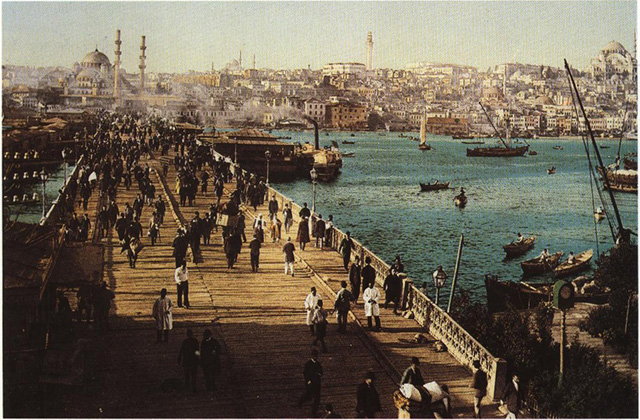Turkey eliminated its minorities from the economy with exorbitant taxes

After the near total physical elimination of the minorities from the Ottoman Empire 1915-23, the Turkish government embarked in 1941 on the financial ruin of the remaining Armenians, Greeks, Jews, and a small number of Turkish Muslims.
Turkish journalist and political analyst Uzay Bulut, formerly based in Ankara, wrote an in-depth article posted on the greekcitytimes.com website, titled: “Wealth Tax Law: How Turkey’s Non-Muslims Were Eliminated from the Economy.”
The chauvinistic government of then Prime Minister Shukru Saracoglu enacted the Wealth Tax Law on November 11, 1942. While the Genocide of the minorities in Turkey has attracted much international attention in recent decades, the seizure of their wealth through taxes has not been as well publicized. The minorities residing in Istanbul were not subjected to mass deportations by the Ottoman authorities due to the presence of foreign embassies in that city which was then the Ottoman Empire’s capital.
Turkish scholar Bashak Ince wrote that the stated aim “was to tax previously untaxed commercial wealth and to rein in the inflationary spiral of World War II. However, the underlying reason was the elimination of minorities from the economy and the replacement of the non-Muslim bourgeoisie by its Turkish counterpart.”
The Turkish researcher Ridvan Akar, who wrote a book about the exorbitant Wealth Tax Law, described it as “economic genocide against minorities.”
Here are the four groups and the percentage of taxes imposed on them according to the 1941 tax law: Armenians (232%), Jews (179%), Greeks (156%) and Muslims (4.94%).
“The way in which the law was applied was scandalous,” wrote Ince, an assistant professor of political science. “Converts paid about twice as much as Muslims, while non-Muslims ended up paying up to ten times as much. In addition, non-Muslims were required to pay their taxes in cash within 15 days; as a result, they had to sell their businesses or property to Muslim businessmen at low prices to cover the bill. The law was also applied to the many poor non-Muslims (numbering 26,000), such as drivers, workers, and even beggars, whereas their Muslim counterparts were not obliged to pay any tax.”
Those who could not pay the taxes were sent to labor camps at Askale, near Erzurum, deported or their properties seized by the government, wrote Bulut.
Author Sidney Nowill described the labor camp as “an area cooler than Moscow in the winter.” The tax debtors were put to work breaking stones, but the tragedy did not end there!
“Out of 40,000 tax debtors,” Ince wrote, “about 5,000 were sent to these camps, and all of these were members of non-Muslim communities. Unfortunately, 21 people died in these camps and the government usurped their wealth and sold it to Turkish Muslims at low prices.”
Furthermore, “The government also confiscated the property of the tax debtors’ close relatives, even if they had been sent into labor service.”
Bulut also quoted historian Corry Guttstadt who wrote in her book, “Turkey, the Jews, and the Holocaust,” about the financial and psychological ruin the Wealth Tax inflicted on the minority non-Muslim citizens of Turkey: “People who were unable to pay were granted a two-week extension on request, but interest was charged for this period. Many families were forced to sell their shops and businesses, their houses, even their carpets, furniture, and other household articles to raise the tax money…. Some people committed suicide in despair. The extraordinary tax was also levied on foreign Jews, and if they were in no position to pay, their property was confiscated down to the beds and cupboards. Although the law stipulated that people over 55 years old were exempt from labor service, 75 and 80-year-old men and even sick people were dragged to the train station and deported.”
Turkish Prime Minister Saracoglu stated at the time: “This way, we’ll break the foreigners’ tight grip over our market and put Turkish money into the hands of Turks.”
Turkish Researcher Sait Chetinoglu has investigated and written extensively on the Turkish government’s Wealth Tax policy, based on historical documents and testimonies of the victims. A Greek-Turkish woman, Marika Shishmanoglu, was quoted as saying that the unreasonably large tax of 30,000 Turkish liras was charged on her father who was forced to sell both of his houses and his shop and was still unable to pay the full amount of the taxes levied on him. So he was deported to the Askale labor camp. Her uncle was also charged an extraordinarily large amount of tax and was financially ruined. He was deported to Askale too. Her father died at the labor camp of Sivrihisar of a heart attack at the age of 57.
“The Wealth Tax was repealed in March 1944, under the pressure of criticism from Britain and the United States,” Bulut wrote. “It was the so-called ‘secular’ Republican People’s Party (CHP), for example, that imposed this ‘jizya — kafir [infidel] tax’ on Turkey’s non-Muslim citizens.”
Turkish journalist Bulut concluded: “The founders and ideologues of Turkey — since the establishment of the Turkish Republic in 1923 — propagated a discriminatory and Turkish supremacist mindset that revealed itself under the slogan ‘Turkey for the Turks.’ All succeeding governments have consciously attempted to make this slogan a reality, turning the lives of religious minorities into hell on earth. The current aggressive policies of the ruling AKP government against non-Muslims are just a continuation of this mentality.”
By Harut Sassounian
Publisher, The California Courier
www.TheCalforniaCourier.com

























